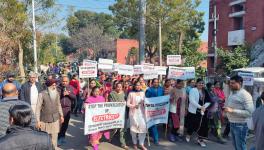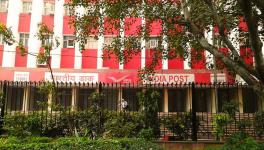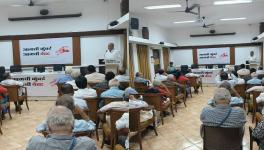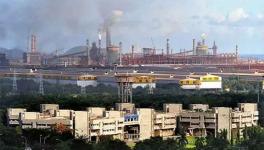4 Lakh Defence Civilian Employees to Go on Three-day Strike
File Photo : Defence Employees Plan Indefinite Strike in Early 2018 to Protest Privatisation
Nearly four lakh defence civilian employees are going on a three-day strike from January 23 to January 25, 2019 against privatisation and closure of the defence industry, and to demand their rightful pension. The call for the strike has been jointly given by the All India Defence Federation (AIDF), Indian National Defence Workers’ Federation (INDWF) and Bharatiya Pratiraksha Mazdoor Sangh (BPMS).
Defence civilian employees are miffed with the government over several accounts subsequent to which they have called for a massive strike. The Government of India had reportedly decided not to make any further investments in the Ordnance Factory Board (OFB) and defence public sector undertakings (DPSUs) earlier in February, 2018. At the same time, the government also moved to sell stakes in two major DPSUs – the Hindustan Aeronautics Limited (HAL), and Bharat Dynamics Limited (BDL).
This move implied that while core military hardware such as battle tanks, combat vehicles and specialised military trucks would remain in the domain of government-owned enterprises, the introduction of products and the creation of additional capacity would have to be undertaken by the private sector.
Indian private companies in defence production are marginal players compared to the foreign original equipment manufacturers (OEMs), and are far less qualified than the DPSUs. In this context, a bigger pie for the private sector in defence would lead to more dependence on foreign companies, further undermining national self-reliance.
The AIDEF, along with other major defence employees’ federations, agitated against the central government’s move to privatise defence production and to marginalise the ordnance factories, stating that the government’s moves were in violation of the agreements they had with the previous governments. Moreover, decisions such as outsourcing more than 250 items manufactured by the 41 ordnance factories to the private sector by declaring those items as “non-core” were taken on the basis of the Shekatkar Committee recommendations, and employees’ federations were not consulted before such recommendations were drafted.
The three federations had protested at the Parliament Street in Delhi on February 15 and on March 15 over the same, but unfortunately, their demands were not taken into consideration.
Government’s stake in two DPSUs was sought to be diluted through the initial public offering (IPO) after an indication that the government is moving in the direction of privatising India’s DPSUs.
Both the companies had been making large profits, with HAL reporting profit after tax of Rs. 2616 crore for the year 2016-17, and BDL registering Rs. 524 crore profit after tax.
The much-debated HAL issue came to the fore because of the Modi Government’s sudden and unilateral decision to change the under-final-negotiation tender for 126 Rafales from Dassault of France – with 108 aircraft to be made by HAL in India through technology transfer – to the new deal for outright purchase of 36 Rafale fighters. This purchase was to be made with Anil Ambani’s Reliance Defence as offset partner which had left HAL high and dry.
Then on the eve of Parliamentary debate came the news that HAL, which was normally cash rich and had showed healthy turnover and profits, had been forced to raise a bank loan to meet staff wages. In the midst of all this, Nirmala Sitharaman, defence minister, stated in Parliament that her government had placed, or had in the pipeline, orders worth Rs. 1 lakh crore for HAL, proving its full support for the DPSU. HAL spokespersons denied this claim, and the Opposition launched a Twitter war, while many commentators wrote fact-checking articles which showed gaps between the defence minister’s statement and the reality of HAL.
C Srikumar, general secretary of the AIDEF told Newsclick, “Other than what has happened in HAL, the government has closed down Army-based workshops, and has handed them over to the private sector, which has affected nearly 12,000 employees, all in the name of GOCO model.”
“The Defence Minister has ordered to offload more than 275 products out of the 650 products being manufactured in the 41 ordnance factories as non-core due to which 25 factories are adversely affected and the workers in these factories are not being compensated in any form,” he added.
He further said that the previous Defence Minister Manohar Parrikar of the same government had promised to raise the profit to 20,000 crore, but till the end of 2017, the profits were raised to 13,900 crore. Whereas, the current defence minister brought it down to 11,200 crore, killing the current growth.
Other than these, also among one of the key demands is regarding the pension contribution of the defence civilian employees. After March 1, 2004, defence civilian employees have been contributing under the National Pension System, whereas the uniformed employees are covered under the Guaranteed Pension.
“We have tried on several occasions to raise these demands, but since no heed was paid, almost 4 lakh defence civilian employees will go on a three-day to make our demands known to the Defence Minister,” Srikumar told Newsclick.
Also read: AIDF Calls for a 3-day Strike Against Privatisation and Closure of Defence Industry
Get the latest reports & analysis with people's perspective on Protests, movements & deep analytical videos, discussions of the current affairs in your Telegram app. Subscribe to NewsClick's Telegram channel & get Real-Time updates on stories, as they get published on our website.
























